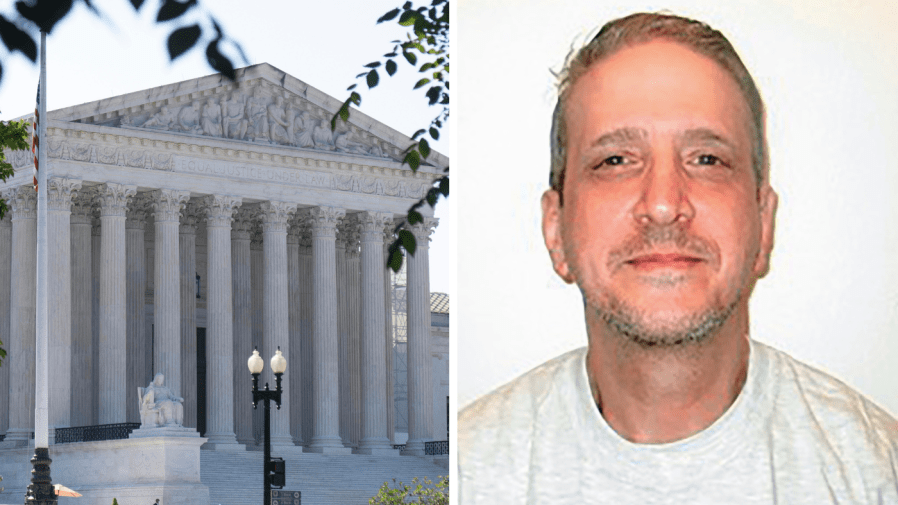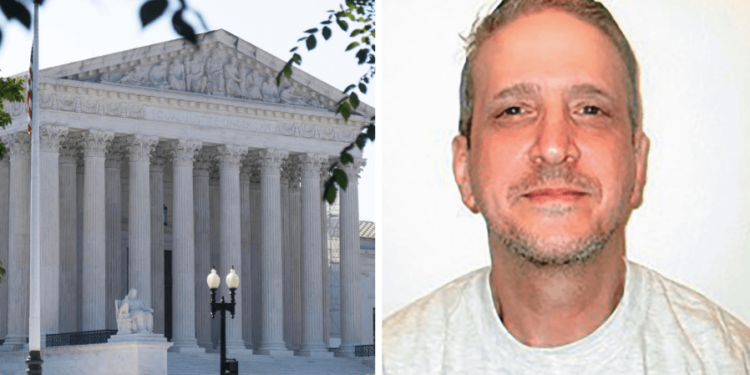
The Supreme Court on Tuesday sided with an Oklahoma death row inmate who claimed alongside the state itself that his trial was unfair, staving off his execution.
Convicted for the 1997 killing of his former boss, Richard Glossip has maintained his innocence for nearly three decades. State prosecutors said he orchestrated a murder-for-hire plot and paid a maintenance worker, Justin Sneed, to commit the killing.
But Glossip alleged the state denied him due process by withholding evidence from the defense and knowingly letting the jury hear false testimony from Sneed, a key witness. The state itself emerged as an unlikely ally to Glossip, admitting the inmate received an “unfair and unreliable trial.”
The justices agreed that Glossip’s trial was unfair, granting him a new one and, in the meantime, throwing out his death sentence. He’s been set for execution nine times — but each time avoided that fate.
“We conclude that the prosecution’s failure to correct Sneed’s trial testimony violated the Due Process Clause,” Justice Sonia Sotomayor wrote for the majority. “Glossip is entitled to a new trial.”
Sotomayor’s majority opinion was joined by four other justices. Justice Amy Coney Barrett concurred in part and dissented in part. Justices Clarence Thomas dissented, which Justice Samuel Alito joined. And Justice Neil Gorsuch did not participate in the case, likely because he participated in one of Glossip’s earlier appeals while serving on a lower court.
During oral arguments in the fall, cracks of division emerged between the justices regarding the importance of new evidence and jurisdiction the high court had to hear the appeal.
In 2022, Oklahoma disclosed evidence revealing Sneed lied to the jury about being prescribed lithium to treat previously undiagnosed bipolar disorder, which state prosecutors knowingly left uncorrected.
Seth Waxman, former U.S. solicitor general under former President Clinton who is representing Glossip, argued that the conviction fell apart then and there, asserting that the death row inmate was convicted on the “word of one man.”
Paul Clement, former U.S. solicitor general under former President George W. Bush who represented Oklahoma, said the findings in the report commissioned by Oklahoma Attorney General Gentner Drummond (R) revealed an obligation to admit the office had erred.
Justice Elena Kagan said plainly that Sneed “lied on the stand.”
But Alito and Thomas questioned whether the new evidence was important or even accurate, with Thomas suggesting the Oklahoma prosecutors weren’t given adequate opportunity to explain and Alito purporting the notes revealing the state’s awareness of Sneed’s condition were too “cryptic.”
On jurisdiction, Sotomayor sparred with lawyer Christopher Michel, appointed to make the argument that Glossip’s conviction should stand and the execution go forward. Sotomayor suggested Michel had “already lost” on his argument that the case should be thrown out over jurisdiction, drawing a pointed glare from Chief Justice John Roberts and chuckles from other justices.
Glossip’s case previously reached the Supreme Court in 2015, when he and two other Oklahoma death row inmates challenged the state’s lethal injection protocol.
They argued that the state’s use of midazolam, a sedative, violated the Eighth Amendment’s prohibition on cruel and unusual punishment because it doesn’t entirely block the effects of two other drugs injected to cause death.
The justices narrowly ruled against the inmates 5-4, writing that the inmates failed to identify a less painful alternative and that states could continue using the drug.
Scores of states, civil liberties groups and current and former state and federal prosecutors filed amicus briefs in support of Glossip’s latest appeal, though the family of his former boss, Barry Van Treese, strongly opposed the derailment of his execution.












